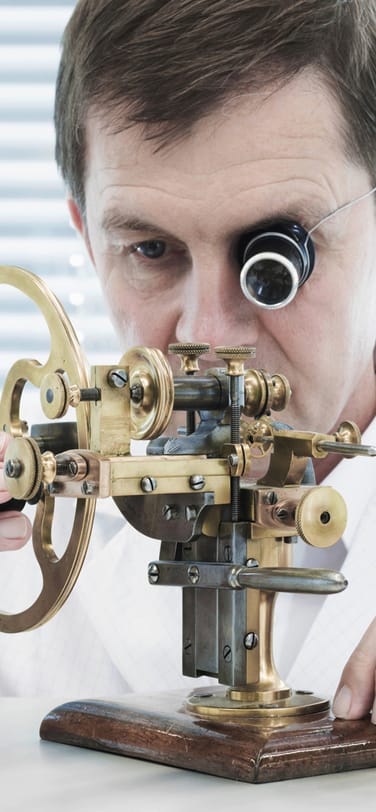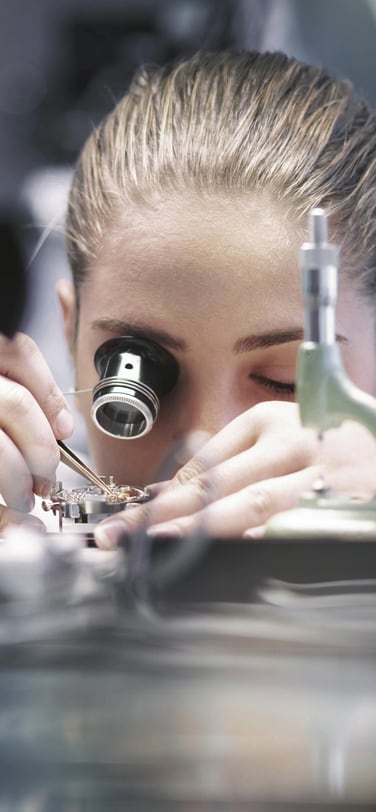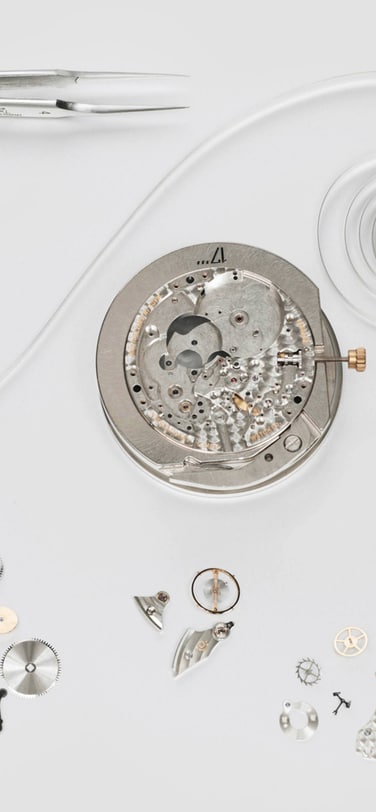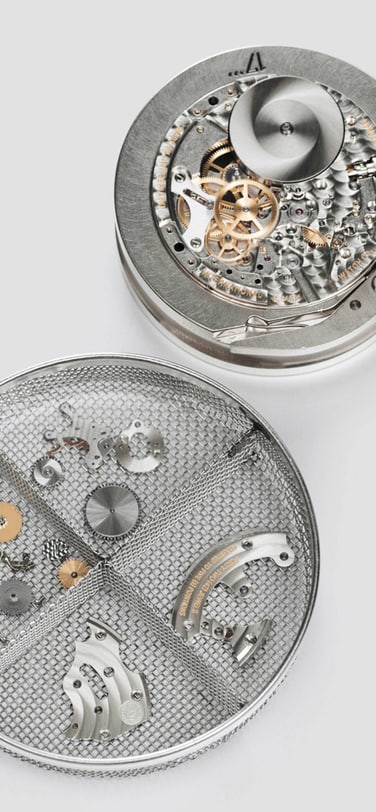World of watches
CRAFTSMANSHIP THAT KEEPS WATCHES RUNNING FOR GENERATIONS
5 November, 2014


Whether they’re diving, climbing or travelling the world on business, IWC owners can be sure of one thing: no matter how tough the going gets, they have a watch that will last them a lifetime. Given regular servicing, a quality timepiece will go on working reliably and precisely for many, many years. All over the world, specially trained IWC watchmakers ensure that repairs and maintenance are carried out professionally, to characteristically high Swiss standards. Unusually old or complicated timepieces go back to the workshops at company headquarters in Schaffhausen, where they are lovingly repaired. Even rare collector’s items, dating back to the company’s earliest days, can be given a new lease of life.
A watch that is worn constantly has to put up with a lot: shocks, impacts and salty perspiration, as well as temperature fluctuations. And as if that were not enough, there is the strain placed on a mechanism designed to go on running continuously, 24 hours a day, 365 days a year. Parts subject to a lot of friction begin to show signs of wear and tear, and even high-quality lubricants age with the years. “To go on running perfectly with maximum precision for years on end, a watch, like any other mechanical appliance, needs regular servicing,” is how Andreas Voll, head of customer service at IWC, sums it up.
In an age when all our electronic gadgetry needs recharging or rebooting daily, it is actually incredible how long a mechanical watch movement will go on functioning perfectly without any intervention whatsoever. A full service is necessary only about once every five years. To start with, a watchmaker dismantles the movement to its individual parts, meticulously checks every single component, cleans away any accumulated dirt and residual lubricant, and then reassembles it. Defective or worn parts are replaced. After careful lubrication, the watch is restarted, the accuracy of the movement carefully checked and, if necessary, the escapement adjusted. The watchmaker also ensures that complications such as a chronograph or perpetual calendar are performing faultlessly.
FOR A VALUABLE WATCH, MAINTENANCE IS LIKE GOING TO A SPA
As you would expect, a full service at IWC also covers the case: after all, a high-quality watch needs to look the part, too. If the case is scratched, for example, it is polished and satin-finished. Laser welding, as it is known, evens out deep gouges or irregularities and restores the watch to its pristine splendour.
All these jobs, of course, take time. Dismantling, cleaning and reassembling the movement, overhauling the case and bracelet and then, finally, carrying out the necessary tests and controls, such as the one for water-tightness, can take up to several weeks. “When an IWC is finally returned to its owner it is as good as new, both inside and out,” says Voll, not without pride.
A service must be expertly conducted and completed within a period acceptable to the owner. After all, no one wants to be separated from a favourite wristwatch for too long. In order to be closer to customers all over the world, IWC Schaffhausen has established a global network of 25 service centres in every continent on the planet, from Munich to Dallas and Peking, and from Sydney to Dubai. “It’s enabled us to cut the time needed for a service and means that owners get their watches back much more quickly than before,” explains Voll. The efforts have certainly paid off: most service and repair jobs are completed within four to six weeks.
TOP-QUALITY SWISS SERVICE WORLDWIDE
One of the major challenges has been building up the necessary watchmaking expertise, particularly in Asia, where, generally speaking, a comparable culture of traditional craftsmanship is unknown. In order to ensure that the demanding service work is carried out to the same high Swiss-quality standards worldwide, IWC has invested heavily in giving its people the necessary professional expertise.
The Watchmakers of Switzerland Training and Educational Program (WOSTEP) gives watchmakers abroad a thorough, two-year introduction to the basic principles of the craft. Afterwards, they can choose from numerous additional training modules specific to IWC. “Course participants get all-round expertise, ranging from basic movements to complications like the perpetual calendar,” explains Voll. Building up this level of expertise involves a huge investment of both time and money. Three Swiss watchmakers from Voll’s team are on the road all year round, ensuring that IWC’s trainees receive the level of training they need.
Ensuring the availability of spare parts worldwide is another major headache. IWC’s current product range is founded on six in-house calibre families and embraces several dozen models as well as limited special editions. “About 40,000 different spare parts, such as cogs, hands, dials, seals and barrels are stored centrally in Switzerland. Every year, we send around a million individual components to service centres all over the world,” says Voll.

RARITIES WITH VERY PERSONAL STORIES TO TELL
The majority of basic service and repair jobs are carried out in these centres. But if a watch is particularly old or has complications such as a tourbillon or a minute repeater, it automatically goes back to Schaffhausen. Once there, it will be in the loving care of virtuosos in the art of watchmaking, some with experience reaching back as much as 40 years.
One of them is Jürg Rüeger. He started his training as an apprentice watchmaker with IWC in 1974. Today, he occasionally finds himself repairing models that he assembled himself, as a young watchmaker. “Re-encountering an old Ingenieur or Portugieser Yacht Club Automatic never fails to give me a warm feeling inside,” he enthuses. On Rüeger’s bench is a collection of rare timepieces that would quicken any collector’s pulse. There’s an extremely well-preserved Pallweber pocket watch with digital display from the year 1890, for instance; next to it a Pilot’s Watch Mark 11 made in 1948 with the hand-wound 89 calibre. Finally, there’s an old pocket watch movement with the legendary 52 calibre that still has a so-called compensation balance.
Watches like these often have a very personal story to tell. On more than one occasion, for instance, IWC’s watchmakers have had to clean movements clogged with margarine or olive oil – the result of the owner’s ham-fisted attempt at lubrication. Another story they love telling is about a customer who managed to mislay her watch at home. Over 30 years later, when she was moving home, the timepiece turned up in its original packing. It had fallen behind a radiator and spent the entire time there, completely unnoticed. Because of the constant heat, the oil had turned solid. Nevertheless, IWC expert restorers were able to solve the problem and return the watch in perfect working order to its delighted owner.

GEMS FROM THE COMPANY’S EARLIEST YEARS
The older the watch, the more difficult it is to find spare parts. On occasion, then, Rüeger has to take a trip down to the treasure-trove deep in the cellars of Schaffhausen headquarters. In this specially dehumidified and fireproof room, to which only a handful of employees have access, are stored tens of thousands of extremely rare or ancient spare parts, all wrapped individually in greaseproof paper and labelled in pencil. The collection goes back all the way to IWC’s earliest years in around 1870. It is also a repository for old tools, such as a gadget specially made to adjust the balance of an old calibre.
Occasionally, no effort or expense is spared to save an unusually old or valuable collector’s item, and the company’s watchmakers will make the parts needed for a restoration themselves. But sometimes – after a fire or flooding, for example – a repair is beyond even the most experienced specialist.
“When I have contact with watch lovers from all over the world, I’m always bowled over by the enthusiasm they show for our watches and their appreciation of the engineering that goes into them,” says Voll, summing up. This enthusiasm can even be demonstrated: IWC watches are returned regularly for servicing for many years on end. And for Voll, this is proof that the timepieces made in Schaffhausen are not merely fashionable items or investments, but accompany their owners for generations.